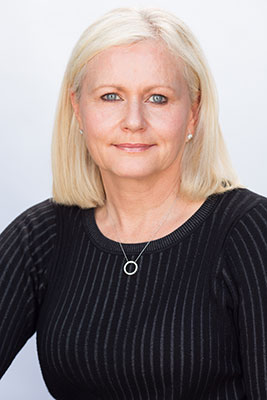
Dr. Polard became a Clinical Psychologist in Germany (1993) and California (2001).
Andrea F. Polard, PsyD
Author of:
- Blog articles for this website and Psychology Today
- A Unified Theory of Happiness: An East-Meets-West Approach to Fully Loving Your Life and Audio Workshop
- The Heart Sutra
- The 10 Habits of Sanity: Enlightenment Guaranteed
Dr. Polard’s new books The 10 Habits of Sanity and The Heart Sutra will soon be available for preorder with bonus gifts.

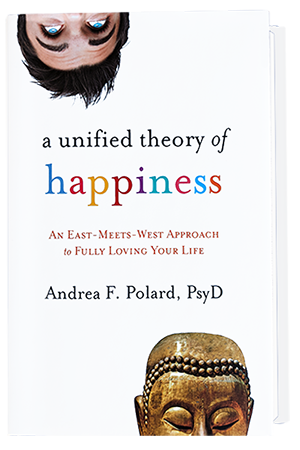
Happiness requires our focused attention. It isn’t chasing the next moment, but “being completely engaged in the present moment.”
We are happy when we skillfully engage with:
- others, especially in friendship and love,
- goals that bring out the best in us,
- and the All of which we are part.
What’s needed is a guide that shows how to engage fully. Personal breakthroughs, life-long meditation, and twelve years of research resulted in the only East-West synthesis that exists.
I offer:
THE ULTIMATE RESOURCE BOOK
A Unified Theory of Happiness:
An East-Meets-West Approach to Fully Loving Your Life.
IS THIS BOOK FOR YOU?
This book is for anybody who is serious about happiness. I make user-friendly the science-based tools of the West and the paths of the wisdom traditions.
Instead of chasing after happiness and looking for it in the future, you will learn to “be here” and flourish. There is nothing better than feeling alive as if in a flow. You will get greater access to flow in two ways:
1. Proactive way: Generate flow with Western tools. With them you can master social connections and pursue inspiring goals with skill and confidence.
2. Supreme way: Halt and become receptive to the miracle of life on peaceful Eastern paths. You will discover the ever flow inherent in Being.
The book is enjoyable:
![]() You can skip around as you see fit.
You can skip around as you see fit.
![]() The Happiness Quiz helps navigate the book material. Try the automated version here.
The Happiness Quiz helps navigate the book material. Try the automated version here.
![]() There are many relate-able examples.
There are many relate-able examples.
![]() Each chapter is followed by an exercise section for practice.
Each chapter is followed by an exercise section for practice.
![]() There are images, graphs, and a touch of poetry that make the science go down like honey.
There are images, graphs, and a touch of poetry that make the science go down like honey.
How do I know you can learn to walk the path of happiness? Well, even I did….
Best Book Award

Spirituality Practices says it’s “One of the Best Spiritual Books”.
I USED TO BE SUPREMELY UNHAPPY
 I was plagued by great doubt and questions, which, incidentally, collided with religious dogma. My most enduring question was: Can people like me be happy? I turned the question endlessly in my head, year after year, but the answer escaped me.
I was plagued by great doubt and questions, which, incidentally, collided with religious dogma. My most enduring question was: Can people like me be happy? I turned the question endlessly in my head, year after year, but the answer escaped me.
I became proactive and overcame posttraumatic stress, formed relationships, and pursued my goal of becoming a psychologist. Still I felt like a stranger in a strange world. Some things must come to us, such as the realization of being interconnected. Finally, silence struck me as I was climbing the stairs of my subway station while asking the oldest of my questions.
I halted. Suddenly I could hear and see as if for the first time. Even though it was loud all around me, the world unfolded quietly and peacefully in me.
The All made sense and became my home at once and for good. I noticed, I was happy.
If people like me can learn to engage with the world and flourish, anybody can.
HAPPINESS IS POSSIBLE
While the book is not a cookie-cutter approach and requires on-going curiosity, it shows clearly how you can experience flow. Just don’t mistake happiness for “feeling wonderful.” True happiness goes beyond feelings. Instead, get ready to learn the SKILLS OF ENGAGEMENT.
Is it possible that you are too unhappy to be happy?
Yes. You might need professional support as I did and now offer as a Zen Psychologist. Asking for support is often the most consequential and courageous act of our lives.
However, do not ever postpone living your life to its fullest. You can work to heal your wounds, assure your basic needs are met, while also beginning to invite happiness into your life today.
Your life holds a promise every single moment you live. It’s never too early for flow experiences.
HOW THE BOOK HELPS YOU TRANSFORM
With the Western tools and Eastern paths, you will love your life more completely.
Why? Because you will get greater access to flow experiences that make you forget your irrational worries and fixations on things that ultimately don’t matter. You’ll learn to focus.
Flow connects you to something greater than yourself. The small world of ego vanishes as your sense of inter-connectedness sharpens. How?
You will learn to A) generate flow with four tools and B) tap into life’s existing flow on four paths.
Love and Social Connectedness
Competence in all Pursuits
Receptivity to the Flow of Life
Reliance on Something Greater than Self
Ambition for Your Goals/Passion
Confidence in all Pursuits
Tranquility/Deepening Inner Peace
Lightheartedness
The book ends with the bonus of The Theory of Elastic Consciousness. While nothing tops practice, this theory helps bring further together Western and Eastern ideas. As you get overall access to flow, you begin to flourish and LOVE LIFE exactly as it unfolds.
WHY IS THE BOOK SPECIAL?
A Unified Theory of Happiness first clarifies what happiness is before sharing the happiness-inviting habits. The definition is derived from real people’s testimony.
The book does not oversimplify. Happiness is not just one good attitude or one special skill. The book lays out all areas in which we need to focus and helps build up an array of crucial skills.
The book is special as it helps the reader walk this path. It is the most comprehensive guide on the market and considered ground-breaking by experts. With a balance of practical tools and transformative wisdom, it is a treasure box for scientific and ancient resources.
Many say that they keep the book at their bedside. It is:
![]() real and down to earth
real and down to earth
![]() clear
clear
![]() comprehensive
comprehensive
![]() full of useful information and wisdom
full of useful information and wisdom
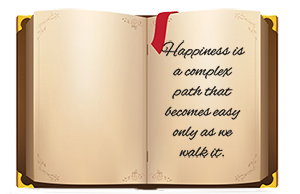
WHAT READERS ARE SAYING
“Polard’s book, backed with research that carefully examines the being-doing dichotomy, not only shows how each dimension has a vital part in the progress of an awakened life but also provides much useful advice on how to make it so.”
DAVID BRAZIER
Author of Zen Therapy and The Feeling Buddha
“Life-changing book! If you put into practice what Dr. Polard suggests, you will see radical changes in your life – for the better!”
TRISTA HENDREN
Author of The Girl God
“A Unified Theory of Happiness is an engaging, warm-hearted, and essential book for anyone looking for sincere ways to find inner peace in modern time.”
HOPE EDELMAN
Author of Motherless Daughters and The Possibility of Everything
“I wholeheartedly recommend “A Unified Theory of Happiness” to anyone who has more than a glancing acquaintanceship with the inner world and who is motivated to fulfillment and to realizing their potential.”
RICHARD HARVEY
Author of Your Sacred Calling
“A major contribution to the fields of positive and transpersonal psychology.”
RONALD A. ALEXANDER
Author of Wise Mind, Open Mind
“Whoever dares to follow the practical guidelines offered in this book risks achieving an interconnected, meaningful, and balanced–in short, happy–life.”
TERRY MARKS-TARLOW
Author of Clinical Intuition in Psychotherapy, Psyche’s Veil, and Creativity Inside Out.
Who AM I
 I love to write about flow as I experience it most of the time. As I remember life without flow all too well, it is my greatest desire to help make it accessible to my fellow people. Besides happiness, I also write about the awakened, aware mind, which are, as I realized, two subjects, not one. They are different but related.
I love to write about flow as I experience it most of the time. As I remember life without flow all too well, it is my greatest desire to help make it accessible to my fellow people. Besides happiness, I also write about the awakened, aware mind, which are, as I realized, two subjects, not one. They are different but related.
My life is not perfect and I am not always as jovial as I am when I walk my dog on a sunny day. When there is a loss, I am as sad as everybody else. I have made friends with my vulnerability. Key to my happiness is the “know-how” I am sharing in A Unified Theory of Happiness, but also the radical acceptance of life as it unfolds in me.
I have never believed that happiness is feeling wonderful all the time. Instead, I feel the wonder of life all the time.
Besides being a writer and a psychologist in private practice, I live in the quiet mountains of Topanga with my husband and three children, our dog Bella, chickens, and several odd and interesting fish. Nature cures me from most of my ills. I consider nature my temple in which I practice walking meditation every day of my life.
THE BOOK IS AVAILABLE IN THREE FORMATS
Please choose the format convenient to you.
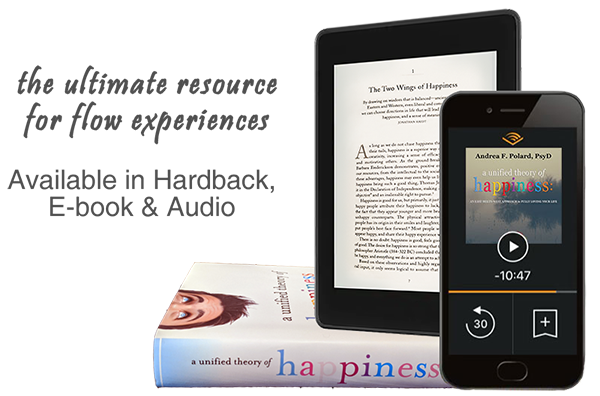
WHY THE WORD “HAPPINESS”?
Happiness is an overused word, but I decided to go for it and define it to move common language towards more depth. Why let pop culture define happiness? It is time to give the word more meaning and listen to the poets and those who have thought through the subject.
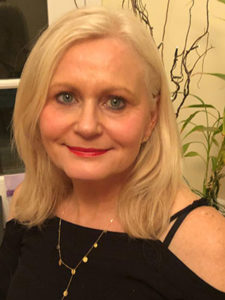 Flow and flourishing are words I also use. They are beautiful, but estrange many who are unfamiliar with them. They need an explanation.
Flow and flourishing are words I also use. They are beautiful, but estrange many who are unfamiliar with them. They need an explanation.
Joy is too blissful for the simple experience of participating fully in life.
Contentment, however essential to happiness as defined in the A Unified Theory of Happiness, does not accurately describe an invigorating, open-heart experience. I like “overwhelming contentment,” but one word beats two words.
So, “happiness” it is.
Discover the tools and paths of happiness, which will sharpen and beautify your mind.
While we will never be able to grasp happiness – we cannot grasp any experience! – we can become skillful in inviting it.
Become a good host for flow experiences and BUY A UNIFIED THEORY OF HAPPINESS NOW.
